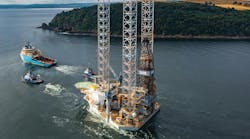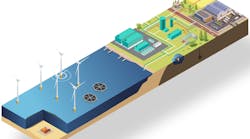Victor Schmidt
Houston
Just the facts
The environmental community is pushing for a move, nay a paradigm shift, away from hydrocarbon-based energy systems to either solar or wind-based systems. They have succeeded in identifying the benefits of electricity, but continue to fail the economic equation.In a recent editorial, IPAA Chairman George Yates highlighted the increased lifespan of people in countries with well-developed electricity grids. Electrified countries yield average lifespans of 75 years. Countries with limited electricity yield average lifespans of 50 years. Energy-dense countries enjoy greater wealth, while energy-limited countries have lower living standards overall.
In a recent issue of Statoil magazine, Helge Kongsjorden pulled together the statistics on Norwegian costs to produce electricity from different sources. The spot price for hydrocarbon-produced electricity is US$ 0.01-0.05/kw-hr. Solar electricity production is clearly uncompetitive at US$ 0.10-1.40/kw-hr. Wind power is somewhat closer at US$ 0.04-0.08/kw-hr.
Hydrocarbons are cheap and plentiful, especially now. Movement to alternative systems will not happen without significant technology advancement to lower costs. Rather than rage against a proven beneficial energy system, concerned groups need to support (raise money for) the necessary technology development. The goal should be to achieve the economic efficiencies of existing systems and improve upon them.
The world runs on the stored energy of the Sun: light, wind, water, and hydrocarbons. Hydrocarbons are the current economic choice. That will not change until technology advance creates a better economic solution.
Justice begun
Six Greenpeace activists were arrested by police in late August after they boarded the Deepsea Bergen, a semisubmersible under contract to Statoil. The boarders (pirates?) were brought to shore and fined NKr 20,000 kroner (? US$2,600) by authorities. Since neither the boarders nor Greenpeace would pay the fine, they will have to stand trial.Explore some more
Collapsing economies have not changed the world's need for hydrocarbon-based energy. Gross volumes required continue to rise. The rate of increase has slowed, but the world still needs more oil and more natural gas. The IEA Monthly Oil Market Report illustrates the point with its 1997-1998 demand increase of 1.48 million b/d of oil and projected 1998-1999 demand increase of 1.63 MM b/d.There is a continual need for exploration to replace depleting fields with new reserves. Mergers can add to a company's reserve base, but do not expand the total reserves available. That requires exploration in mature areas, in remote locales and in deeper, more challenging waters.
The current national overproduction battle is short-term. The larger war to supply the world's energy needs looms before us.
Surface waterflooding
Excessive water has always been a problem in oil operations. Whether it is drilling for oil and finding salt water, drilling and experiencing a shallow flow problem, or producing a strong water- cut with oil, getting ridof unwanted water is a problem.
China is experiencing an unusual waterflow, surface flooding that has caused the shut-in of over 2,000 producing wells. This stresses an already strained oil industry and will temporarily slow China in the quest for increased production. The offshore sector will be asked to do more and is spurring major changes in their industry (see related article).
Baku-Ceyhan
The proposed Caspian oil pipeline from Baku, Azerbaijan to Ceyhan, Turkey is moving slowly forward. Faud Akhundov, President of the Azerbaijan International Bank, announced that Azerbaijan will finance 50-60% of the construction costs. Secondary support from the European Bank for Reconstruction will help the country establish a pipeline company. Cost estimates are still being developed.Short-term strain, long-term gain
The financial markets have spoken. Investor confidence levels have backed off to the 3-5 year range, based on demand for US government bonds. It will take time to reorganize the emerging economies.World economic growth is slowing, giving the industry some breathing space before the next round of strong demand growth. This should be enough time for new petroleum industry projects and production systems to come online. Once national governments restructure themselves and set more market-friendly policies, international investor confidence will return to fund expansion into the next century.
Longer-cycles for governments
The current worldwide financial crises are part of a long-wave restructuring of world governments and economies that had first expression with the oil-price collapse of 1986. Free market economies responded immediately, forcing efficiencies on all energy companies.The low-price pressure began to work its magic on governments dependent on natural resource sales, but with a longer cycle time. The collapse of the Soviet system followed in 1991, beginning a round of falling government and economic dominoes. West Africa, Mexico, and Argentina followed with restructuring at all levels. The restructuring wave crested this year with the collapse of Southeast Asian economies.
It is ironic that Western democracy's fear of domino theory in Asia should become transmuted and inverted. Rather than governments falling to communist-supported military actions, governments and economies collapsed in response to financial market discipline. Global investors forced change upon governments, 10 or more years after the initial price pressure.
Oil prices are not the only force affecting government's policies, but it is clear that open, efficient markets have won the political/economic competition. Energy and economic viability are key components of all governments' public support. Building and maintaining an effective economy is a key purpose of government. From it flow economic strength and the ability to serve the broader well being of the population.
Copyright 1998 Oil & Gas Journal. All Rights Reserved.




